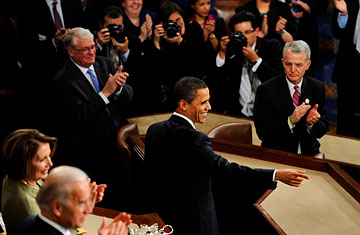
President Barack Obama, after delivering his first address to a joint session of Congress on Feb. 24
Rarely has a pep talk come with so much pomp.
The setting, for starters, was no high school locker room at halftime, with sweaty teenagers scratching their gym socks. Robed Supreme Court Justices and barrel-chested generals sat in the front row at the U.S. House Chamber, a gold-encrusted place overflowing with political power. For a quarter-mile around, police stood shivering in the cold, watchful in clumps on street corners, stopping anyone who looked out of place. (Read the full text of Obama's speech.)
And the coach commanding everyone's attention in the center of the room was no amateur part-timer looking to relive his glory days on the court. He was none other than the President of the United States, Barack Hussein Obama, the most watched man in the world, who had come before his country and its government during prime time to say, "Come on, team, we can play better. When the buzzer sounds again, we're going to go out there and play our game, like the champions we know we are." (See the top 10 greatest speeches in history.)
He didn't use those words exactly. But he came pretty close. "We will rebuild. We will recover, and the United States of America will emerge stronger than before," he announced upon taking the podium on Tuesday for his first presidential address before a joint session of Congress.
"My job — our job — is to solve the problem," Obama said at one point. "In our hands lies the ability to shape our world for good or ill," he said at another. He pointed to the gallery, where Ty'Sheoma Bethea, an eighth grader from Dillon, S.C., sat. She had recently written a letter to Congress and the President to ask for help, as her school is crumbling and in need of repair. "We are not quitters," the letter said. Obama faced his audience. "We are not quitters," he repeated. (Read "Sparing a Dime to Save a College.")
He spoke of the whole country as a single team, evoking a patriotic spirit that has brought the nation back from the brink of collapse before. "Even in the most trying times, amid the most difficult circumstances, there is a generosity, a resilience, a decency and a determination that perseveres, a willingness to take responsibility for our future and for posterity," he said.
The crowd, as is tradition, repeatedly came to its feet. They cheered collectively when Obama spoke again of an "America that does not quit" and when he called on his countrymen to be "something worthy to be remembered." They cheered when he predicted, as others had before him, a "cure for cancer in our time" and when he announced a suite of new initiatives, including the promise of an affordable education for all Americans if they volunteer in their community or serve their country. "By 2020, America will once again have the highest proportion of college graduates in the world," he said. "Tonight, I ask every American to commit to at least one year or more of higher education or career training." (Read "Under Financial Stress, More Colleges Cap Enrollments.")
Not everyone in the room received the speech with the same eager delight. At one end of the chamber, Jon Favreau, Obama's 27-year-old speechwriter, stood nervously with his back against the wall, alternately mouthing the words as Obama spoke them, applauding and checking his BlackBerry for reactions from the ether. At the other end of the chamber sat a diminished Republican caucus, self-consciously rising and falling like pistons to show their alternate approval and disdain for the President's policy prescriptions.
When Obama said the recently passed stimulus bill contained no earmarks, some erupted in bouts of derisive laughter. When Obama warned of those who make the "same old claims" that rolling back tax breaks for the wealthy is a "massive tax increase on the American people," one Congressman shouted out of turn, "You're right!" A large group of Republicans broke into disruptive cheering when Obama vowed to not pass on to the nation's children a "debt they cannot pay."
The Democratic caucus had its moments as well. In the very next line, Obama began, "With the deficit we inherited" — but could go no further because of Democratic delight in pointing out that today's fiscal problems were delivered by a Republican President and Republican Congress. The same group was equally delighted when Obama said that Bush had used the budget surpluses of 2000 as "an excuse to transfer wealth to the wealthy instead of an opportunity to invest in our future."
But Obama did not allow his party to dwell on finger-pointing. He kept talking through their applause, forcing them to return to their seats. A coach, after all, cannot lead a team divided. He told the country's leaders, Democrats and Republicans, supporters and opponents of his presidency, that he knew "every American who is sitting here tonight loves this country and wants it to succeed." He continued, "That must be the starting point for every debate we have in the coming months, and where we return after those debates are done. That is the foundation on which the American people expect us to build common ground."
And then he broke up the huddle and sent his players out to face their toughest opponents in a generation: the biggest economic catastrophe that America has faced since World War II, ongoing wars in several countries and a fiscal time bomb that, unless it is defused, will destroy the American dollar and the American future. The odds are daunting, but now everyone knows the coach believes we can still be champions.
See Obama's agenda to get the U.S. back on track.
